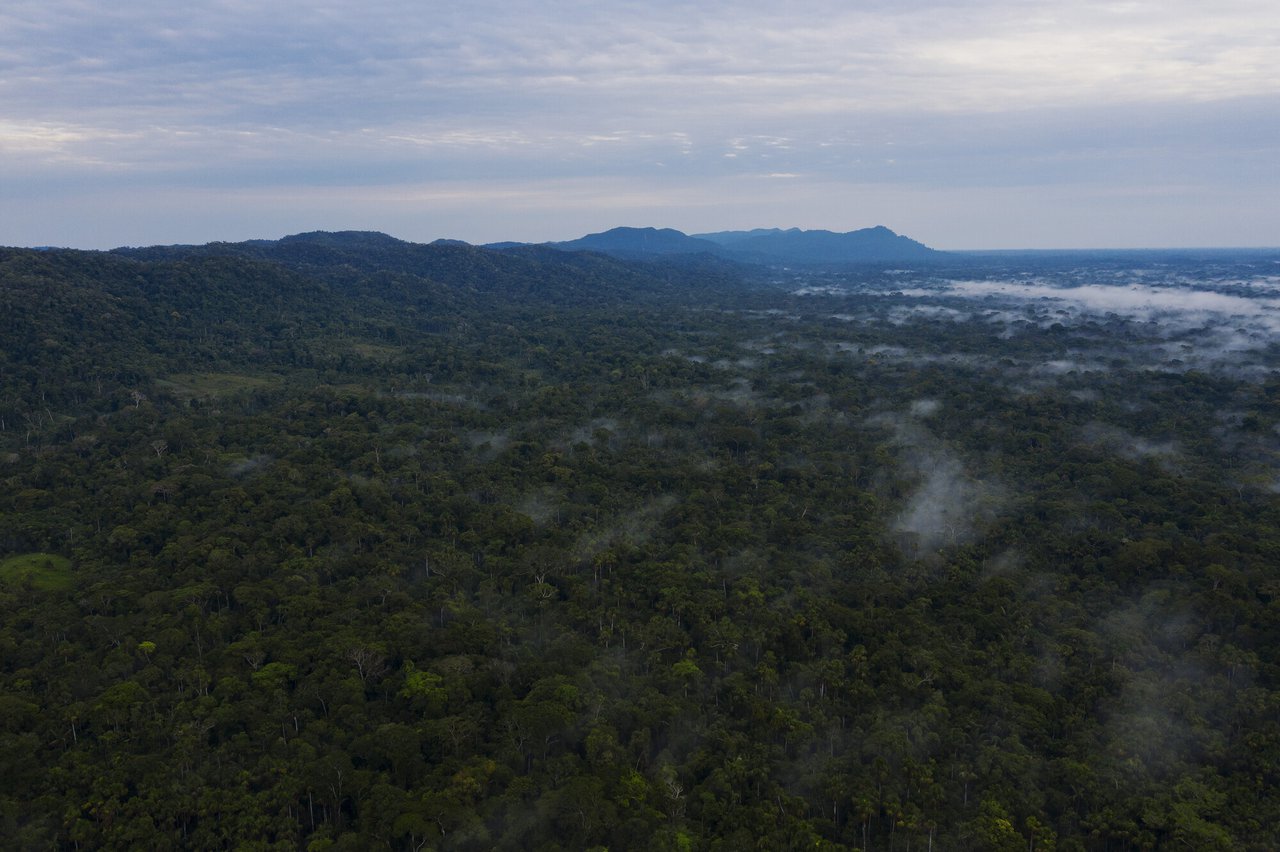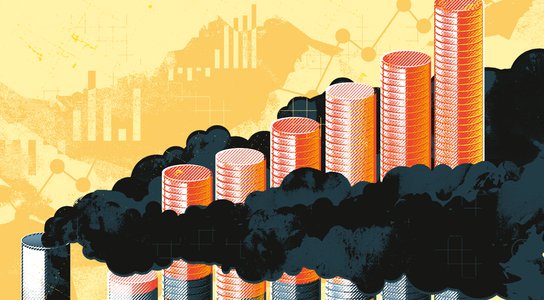Yesterday, to mark Earth Day, forty world leaders came together to join the two-day Leaders Summit on Climate
hosted by US President Joe Biden. The Leaders Summit on Climate
underscores the urgency - and the potential economic benefit - of strong
climate action.
Thus far, President Biden has sent a strong message that his administration will ensure the US is at the forefront of global efforts to tackle the climate crisis. He has rejoined the Paris Climate Agreement and signed a variety of environment-focused executive orders. However, his newly unveiled plan on International Climate Finance fails to mention climate-critical forests, which need more protection than ever.

Amazon rainforest in Acre state, Brazil. Lalo de Almeida/Panos/Global Witness
Brazil, which is home to the world’s largest climate-critical forest landscape, is among the seventeen countries represented at the summit. President Biden has committed to safeguarding tropical forests with his campaign promise of $20 billion to protect the Amazon rainforest, which has seen a massive increase in deforestation under President Jair Bolsonaro. This Amazon fund has been the subject of some controversy, with indigenous groups, environmental campaigners and civil society activists claiming they have been shut out of the negotiations.
While pledging money to help protect the Amazon may be seen as a welcome step by some, President Biden must turn his attention to the money driving this destruction in the first place if he is serious about tackling climate change and global deforestation. This starts by addressing the role played by the US’s own financial sector in fueling deforestation.
The role of forests in the climate crisis
Deforestation is a key driver of the climate crisis. Trees absorb emissions from the air, acting as a great storage system – or ‘carbon sink’ - for the greenhouse gases that contribute to global heating. Moreover, they act as nature’s air conditioning unit, transpiring water, which forms clouds. When they are felled, regional temperatures rise; this leads to drying and devastating forest fires around the world, from California to the Congo Basin. Keeping forests standing could provide more than one-third of the total CO2 reductions needed to keep global heating below 2°C by 2030.
Yet despite the crucial role played by forests in helping address climate change, they are being destroyed at alarming rates. According to data from the University of Maryland and the monitoring platform Global Forest Watch, the loss of primary tropical forest cover in the last year is well above the average for the last 20 years - amounting to some 4.2 million hectares (10.4 million acres) or, an area the size of the Netherlands.
The resulting carbon emissions from 2020’s forest loss alone is equivalent to the annual emissions of 570 million cars, more than double the number of cars on the road in the United States.
The US has one of the highest global deforestation footprints, due to its consumption of commodities that drive forest destruction and its financial institutions are major sources of finance for these products around the world. Much of the deforestation tied to these commodities globally is occurring in the world’s most climate-critical forests, such as those in the Amazon, Congo Basin and Papua New Guinea. In addition to being vital for our climate, these tropical forests are some of the most biodiverse ecosystems in the world, help safeguard against future pandemics of zoonotic diseases like Covid-19 and are home to indigenous communities.
To address this, there are currently considerations in Congress around a potential bill with the objective of tackling illegal deforestation in supply chains. Importers would have to trace supply chains and prove commodities were sourced legally, if passed. Countries with a history of illegal deforestation will have higher requirements for reporting and tracing.
But what often gets left out of the conversation is the crucial role played by US and global banks in funding the companies behind this deforestation.
The Wall Street banks funding forest destruction
Global finance provides a vital lifeline to businesses destroying the world’s forests. We revealed that between 2013 and 2019, the most destructive agribusiness companies were backed to the tune of $44 billion by over 300 investment firms, banks, and pension funds across the globe.
The US remains one of the largest global financial centers and its banks and investors are some of the biggest backers of destructive agribusiness. The companies razing forests to produce palm oil, beef, and rubber are able to secure financing for new projects at commercially attractive rates from banking giants on Wall Street. According to the “Forest and Finance” data, US banks invested around $25 billion into forest-risk companies from 2013-2020.
Over the last decade, we have seen many financial institutions commit to tackling deforestation and other human rights abuses through ineffective voluntary initiatives. Twelve big banks - including the US-based JP Morgan - adopted the Soft Commodities Compact, which aimed (and failed) to achieve zero net deforestation by 2020 in the soy, palm oil, beef and timber products supply chains of around 400 companies with combined sales of 4.1 trillion dollars. In fact, figures from “Forests and Finance” show that banks that adopted the Compact have considerably increased their financial exposure to forest-risk companies since 2014.
Ultimately, there is little transparency and accountability over how banks put these voluntary commitments into practice and it is clear that self-regulation by financial institutions is failing to stop forest destruction.
If the Biden Administration truly wants to galvanize international efforts to curb climate change, they must therefore look beyond an approach that relies on voluntary policies and commitments. The US administration should bring forward measures to end the complicity of US financiers in global deforestation and demand US financiers undertake checks on deforestation risks. This is an approach already under consideration in the UK and EU.
Forest communities under threat
Wall Street’s continued bankrolling of forest destruction is also undermining the safety, livelihoods and human rights indigenous and forest communities who have safeguarded their forests for generations.
In our reports, Money to Burn and Beef, Banks, and the Brazilian Amazon, we showed how the US-based bank, Morgan Stanley, appeared to have failed to do adequate due diligence on the deforestation and human rights risks posed by major beef traders Marfrig and JBS, and failed to scrutinize how their financing is compatible with their zero-deforestation commitments. We exposed how between 2017 and 2019, JBS bought from 327 ranchers containing over 20,000 football fields of illegal deforestation, some of which were linked to violent human rights abuses against landless peoples – though JBS denied any wrongdoing, as did the ranchers involved. We also reported on how Marfrig bought from ranchers that were illegally raising cattle in indigenous territory – though it also denied wrongdoing. Morgan Stanley responded that its shares were held on behalf of others.
This is part of a broader trend of growing threats against communities standing up to destructive businesses. Our most recent report into the killings of land and environmental defenders shows 212 land and environmental defenders were killed – an average of four people a week and the highest number yet have been murdered in a single year. The stakes have never been higher.
Biden has rightly committed to place environmental justice at the heart of his domestic climate policies and address the disproportionate impacts on communities of color, low-income, and indigenous communities. This commitment must transcend US borders and apply to all those most affected by the climate crisis, including those who depend on and defend their forests.
If President Biden wants to live the values he espoused in his recent speech on foreign policy, and truly “treat every person with dignity,” then he must scrutinize the actions of companies that abuse and profit off people and the environment.
An opportunity for Biden to protect the world’s forests
We know that President Biden has big ambitions for protecting the climate. However, the US will be severely undermined in its move to become a climate leader if its own banks and investors are complicit in forest destruction. President Biden has a critical opportunity to curtail US financing away from destructive supply chains by passing strong legislation that compels all businesses, including the finance sector, to ensure they are not linked to deforestation. Doing so will encourage other governments to take action and send a vital message to the rest of the world - that the US itself is no longer willing to partake in the destruction of climate-critical forests and related human rights abuses. The window to avert further climate catastrophe and re-tool our economies to work for both people and planet is painfully short. Decisive action by the US could be just the leadership needed to help turn the tide.


